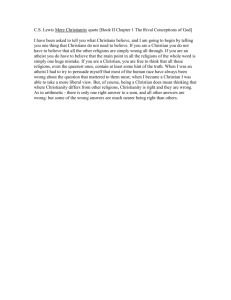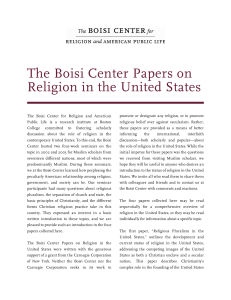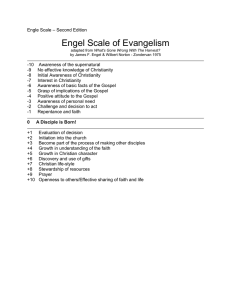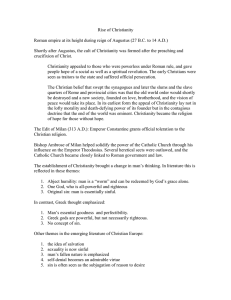Reformed Theological Seminary - Charlotte HISTORY OF CHRISTIANITY I
advertisement
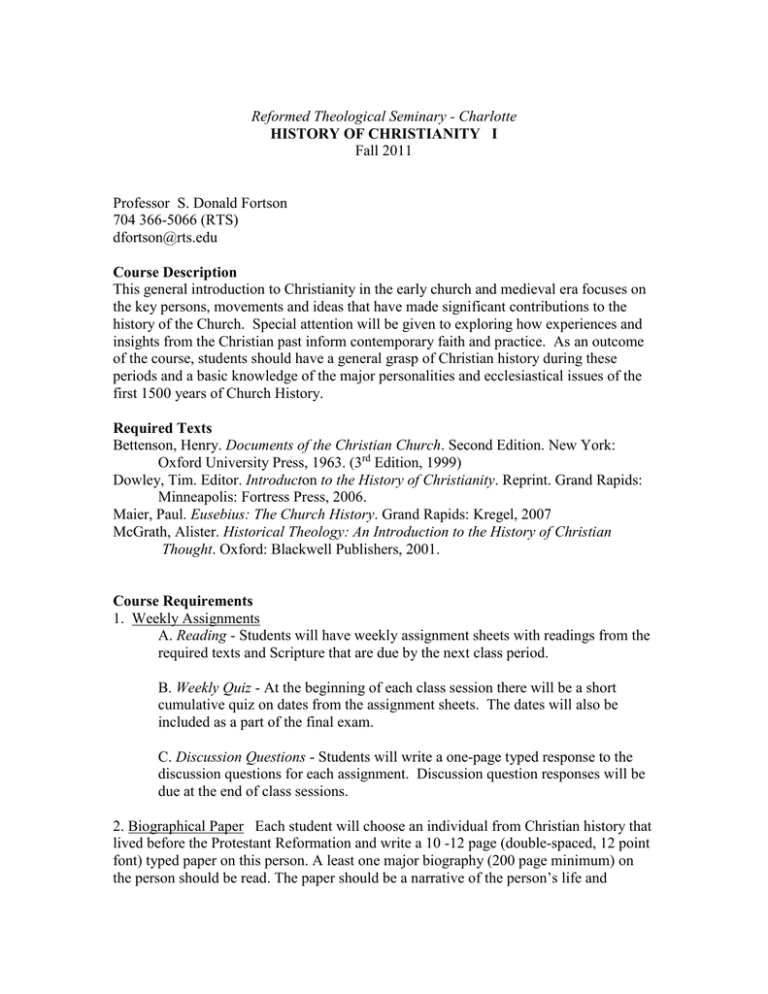
Reformed Theological Seminary - Charlotte HISTORY OF CHRISTIANITY I Fall 2011 Professor S. Donald Fortson 704 366-5066 (RTS) dfortson@rts.edu Course Description This general introduction to Christianity in the early church and medieval era focuses on the key persons, movements and ideas that have made significant contributions to the history of the Church. Special attention will be given to exploring how experiences and insights from the Christian past inform contemporary faith and practice. As an outcome of the course, students should have a general grasp of Christian history during these periods and a basic knowledge of the major personalities and ecclesiastical issues of the first 1500 years of Church History. Required Texts Bettenson, Henry. Documents of the Christian Church. Second Edition. New York: Oxford University Press, 1963. (3rd Edition, 1999) Dowley, Tim. Editor. Introducton to the History of Christianity. Reprint. Grand Rapids: Minneapolis: Fortress Press, 2006. Maier, Paul. Eusebius: The Church History. Grand Rapids: Kregel, 2007 McGrath, Alister. Historical Theology: An Introduction to the History of Christian Thought. Oxford: Blackwell Publishers, 2001. Course Requirements 1. Weekly Assignments A. Reading - Students will have weekly assignment sheets with readings from the required texts and Scripture that are due by the next class period. B. Weekly Quiz - At the beginning of each class session there will be a short cumulative quiz on dates from the assignment sheets. The dates will also be included as a part of the final exam. C. Discussion Questions - Students will write a one-page typed response to the discussion questions for each assignment. Discussion question responses will be due at the end of class sessions. 2. Biographical Paper Each student will choose an individual from Christian history that lived before the Protestant Reformation and write a 10 -12 page (double-spaced, 12 point font) typed paper on this person. A least one major biography (200 page minimum) on the person should be read. The paper should be a narrative of the person’s life and contribution to the Church of his/her day based on the biography read. The paper should conclude with a one-page reflection on insights from the person’s life that might be useful today. It is not necessary to use footnotes for summaries of historical information if one is using only one book as the primary source. However, if there are direct quotations from this one book, page numbers should be indicated. If one is using multiple sources, footnotes would be proper to indicate the source of specific information. Choosing a biography Students are free to select from a wide array of biographies. One may choose an Early Church Father, a martyr, a medieval scholastic or mystic, a Christian emperor, a Pope, a Christian king, a monk, reformer or any significant Christian that lived before Martin Luther. There are many options; use the Dowley text and course lectures to help you make a good choice. Autobiographies, such as Augustine’s Confessions, do not qualify for this assignment. Do not use a biography you have read before; learn about someone new. You may select an individual for whom there is not a full 200-page biography. One option is to read a shorter biography and then read some of that person’s writings up to the 200 page minimum requirement. For example, if you find a 100-page biography, you will need to supplement that with another 100 pages (at least) of his/her writings. Students are welcome to use multiple sources for the biography paper but this is not necessary. One 200-page biography will fully satisfy the assignment. Where to look If you live near a Bible College, Christian University or Seminary, you will find a wealth of options in these libraries. Public universities and public libraries will also have a few biographies of famous Christians like Augustine, St. Patrick, Francis of Assisi or Thomas Aquinas. If your home church has a library, you may find something there. Also, your pastor may have a few Christian biographies in a personal library. Students may also wish to consider purchasing a good biography that would be a useful addition to their own library. There are many places to look and one should not have a problem locating an acceptable biography. A bibliography should be attached even if it is only to list one source. The due date is December 6. 3. Final Exam The examinations will include essay questions from the required reading and lectures. There will also be short-answer sections on important dates, people and ideas. The final may be taken any time during Exam Week. 4. Reading Report – The Reading Report (see attached) will be due Dec. 13. This report will indicate the amount of Required Reading that has been completed during the semester. Students may either indicate their reading for semester on final exam or turn in attached report by the deadline. 4. Class participation: Per seminary policy, it is required that students be present for all class sessions. In an emergency, you may notify professor that you have been “providentially hindered” from attendance. It is expected that students will keep current in their reading and hand in assignments on time. Failure to comply with these standards will result in grade reduction. Grading Weekly Quizes and Discussion Questions - 25% Biographical Paper - 25% Reading Report - 25% Final Exam - 25% MDiv* Student Learning Outcomes In order to measure the success of the MDiv curriculum, RTS has defined the following as the intended outcomes of the student learning process. Each course contributes to these overall outcomes. This rubric shows the contribution of this course to the MDiv outcomes. *As the MDiv is the core degree at RTS, the MDiv rubric will be used in this syllabus. Broadly understands and articulates knowledge, both oral Articulation and written, of essential biblical, theological, historical, and (oral & written) cultural/global information, including details, concepts, and frameworks. Scripture Significant knowledge of the original meaning of Scripture. Also, the concepts for and skill to research further into the original meaning of Scripture and to apply Scripture to a variety of modern circumstances. (Includes appropriate use of original languages and hermeneutics; and integrates theological, historical, and cultural/global perspectives.) Reformed Theology Significant knowledge of Reformed theology and practice, with emphasis on the Westminster Standards. Sanctification Desire for Worldview Demonstrates a love for the Triune God that aids the student’s sanctification. Rubric Strong Minimal Minimal Strong Mini-Justification Strong Moderate Minimal None 1. Memorization of dates 2. Development of doctrine 3. Biographical studies 1. Weekly bible reading assigned 2. Scripture-based devotions 3. Discuss churches interpretation of Bible throughout course 1. Focus on pre-Reformation 2. Ancient faith and practices 3. Medieval theology 4. Augustinian doctrines of grace 1. Monastic Spirituality 2. Medieval mysticism 3. Piety of St. Augustine 4. Practice of Prayer Burning desire to conform all of life to the Word of God. None Winsomely Reformed Preach Worship Shepherd Church/World Embraces a winsomely Reformed ethos. (Includes an appropriate ecumenical spirit with other Christians, especially Evangelicals; a concern to present the Gospel in a God-honoring manner to non-Christians; and a truth-in-love attitude in disagreements.) Ability to preach and teach the meaning of Scripture to both heart and mind with clarity and enthusiasm. Knowledgeable of historic and modern Christian-worship forms; and ability to construct and skill to lead a worship service. Ability to shepherd the local congregation: aiding in spiritual maturity; promoting use of gifts and callings; and encouraging a concern for non-Christians, both in America and worldwide. Ability to interact within a denominational context, within Strong 1. Emphasis on catholic Christianity 2. Cover Church history that belongs to all Christians 3. Ecumenical Creeds Moderate 1. Church history illustrations for preaching 2. J. Chrysostom’s preaching style 1. Ancient and Medieval liturgy 2. Importance of creeds Minimal 1. Expansion of Early Church 2. Missionary monks Minimal 1. Weekly application discussion Q. the broader worldwide church, and with significant public issues. Moderate 2. Discernment of what’s important BIBLIOGRAPHY Church History Surveys Bainton, Roland. Christendom: A Short History of Christianity and its Impact on Western Civilization. 2 Vols. New York: Harper and Row, 1966 Chadwick Henry, and Owen Chadwick, gen. eds. Oxford History of the Christian Church. Multi-volume set. NY: Oxford University Press, 1977. Dowley, Tim, ed. Eerdman's Handbook to the History of Christianity. Reprint. Grand Rapids: Eerdmans Publishing Co., 1978. Gonzalez, Justo L. The Story of Christianity. 2 vols. NY: Harper and Row, 1984. Latourette, Kenneth Scott. A History of Christianity. Revised ed. 2 Vols. NewYork: Harper and Row, 1975. __________ A History of the Expansion of Christianity. 7 vols. in 8. NY: Scribner, 18821910. Jedin, Hubert and John Dolan, eds. History of the Church. 10 vols. NY: Seabury,1979. Quasten, Johannes. Patrology. 4 vols. Utrecht: Spectrum; Westminster, MD: Christian Classics, 1950-86. Schaff, Philip. History of the Christian Church. 8 vols. Reprint. Grand Rapids: Eerdmans, 1949-50. Walker, Williston. A History of the Christian Church. 3rd ed. New York: Charles Scribner's Sons, 1970. History of Doctrine Berkhof, Louis. The History of Christian Doctrines. Grand Rapids: Baker Book House, Reprint 1976. Bettenson, Henry. Documents of the Christian Church. New York: Oxford University Press, 1967. Cunningham, William. Historical Theology. London: Banner of Truth Trust, 1960. H. Cunliffe-Jones. A History of Christian Doctrine. T&T Clark. Gonzalez, Justo. A History of Christian Thought. 3 Vols. reprint ed., Nashville: Abingdon Press, 1992. Harnack, Adolf. History of Dogma. 4 vols. Reprint. Gloucester, MA: Peter Smith, 1976. __________. Outlines of the History of Dogma. Boston: Beacon Press, 1957. Kelly, J.N.D. Early Church Doctrines. reprint ed., San Francisco: Harper Collins, 1978. Lane, Exploring Christian Thought. Nashville: Thomas Nelson Publishers, 1984 Lohse, Bernhard. A Short History of Christian Doctrine From the First Century to the Present. Trans. F. Ernest Stoeffler. Rev. Ed. Phil.: Fortress Press, 1985 McGrath, Alister. Historical Theology. Oxford: Blackwell Publisher, 2001 Pelikan, Jaroslav Jan. The Christian Tradition. 5 Vols. Chicago: University of Chicago Press, 1971-89. Seeberg, Reinhold. History of Doctrines. Reprint. Grand Rapids: Baker, 1977. Tillich, Paul. A History of Christian Thought. New York: Harper and Row, 1968. Primary Source Collections Bromiley, Geoffrey. Historical Theology An Introduction. Grand Rapids: William B. Eerdmans Publishing Company, 1978. Culbertson, Philip and Arthur Shippee. The Pastor: Readings from the Patristic Period. Minneapolis: Fortress, 1990. Deferrari, R.J. The Fathers of the Church: A New Translation. 70 vols Washington, D.C., Catholic University of America Press, 1947Forell, George W. ed. Christian Social Teachings. Minneapolis: Augsburg Publishing House, 1971. Leith, John. Creeds of the Churches. Atlanta: John Knox Press, 1977. Lull, Timothy. ed. Luther's Theological Writings. Minneapolis: Fortress Press, 1989. McGrath, Alister. ed. The Christian Theology Reader. Cambridge: Blackwell Publishers, 1995 Oates, Whitney J. Editor. Basic Writings of Augustine. 2 Vols, Baker Bk.House,1980. Quasten , Johannes and Joseph C. Plumpe, ed. Ancient Christian Writers: The Works of the Fathers in Translation. 55 vols. New York: Newman Press,1946. Schaff, Philip. Creeds of Christendom. 3 Vols. reprint ed., Grand Rapids: Baker Book House, 1993. The Classics of Western Spirituality: A Library of the Great Spiritual Masters. 63 vols. NY: Paulist Press, 1979 Schaff, Philip.ed. Ante-Nicene, Nicene and Post-Nicene Fathers. 36 Vols. Reprint ed., Grand Rapids: William B. Eerdmans Pub. Co., 1991. The Library of Christian Classics: Ichthus Edition. 20 vols. Louisville:Westminster Press. Wiles, Maurice and Mark Santer, eds. Reprint ed., Documents in Early Christian Thought. Cambridge: Cambridge University Press, 1989. Encyclopedias , Handbooks and Dictionaries Beinert, Wolfgang and Francis Schussler Fiorenza. Handbook of Catholic Theology. New York : The crossroad Publishing Co., 1995 Brauer, Jerald C. ed. The Westminster Dictionary of Church History. Philadelphia: Westminster, 1971.Church. Reprint. Oxford University Press, 1990. Cross, F.L. and E. A. Livingstone ed. The Oxford Dictionary of the Christian Church, Oxford Univ. Press. Di Berardino, Angelo, ed. Encyclopedia of the Early Church. Trans. by Adrian Walford.2 vols. New York: Oxford Univ. Press, 1992. Douglas, J.D., ed. The New International Dictionary of Church History. Grand Rapids: Zondervan, 1978. . Edwards, Paul, ed. The Encyclopedia of Philosophy. 8 vols. NY: Macmillan, 1967. Elwell, Walter. ed. Evangelical Dictionary of Theology. Grand Rapids: Baker, 1984. Ferguson, Everett, ed. Encyclopedia of Early Christianity. New York: Garland Publishing, Inc., 1990. Ferguson, Sinclair B.; Wright, David F.; and Packer, J.I., ed. New Dictionary of Theology. Downers Grove, Illinois: Inter-Varsity Press, 1988. Harrison, Everett F., ed. Baker's Dictionary of Theology. Reprint., Grand Rapids: Baker Book House, 1981. Hart, Trevor. The Dictionary of Historical Theology. Grand Rapids: Eerdmans, 2000 Hastings, James, ed. Encyclopedia of Religion and Ethics. 12 vols. NY: Scribners, 190834. Reprint. Scribners, 1961 Jackson, Samuel M. ed.The New Schaff - Herzog Encyclopedia of Religion, 12 vols. New York: Funk and Wagnalls Co., 1908-1914 McClintock, J. and Strong, J., ed. Cyclopedia of Biblical Theological and Ecclesiastical Literature. 10 vols. New York: Harper & Bros., 1867-87. McDonald, William J., ed. The New Catholic Encyclopedia. 15 vols. NY: McGraw-Hill, 1967. Muller, Richard A. Dictionary of Latin and Greek Theological Terms. Grand Rapids: Baker Book House, 1985. Richardson, Alan and Bowen, John, eds. The Westminster Dictionary of Christian Theology. Philadelphia: Westminster, 1983. History of Christianity I Assignment 1 – September 6, 2011 Reading: 1. Introduction to Hist. of Christianity, pp.14-28,34-36,57-81. 2. Documents of the Christian Church, pp. 62-67 (68-73, 3rd Edition) 3. Historical Theology, pp. 1-16 4. Eusebius, Book 1 5. Acts chapters 1-11, Romans 1:8-16, 1 Corinthians 9:16-27 Dates to Remember: 35 A.D. Paul's conversion 64 A.D. Nero's persecution 70 A.D. Destruction of Jerusalem 100 A.D. St. John's death Discussion Questions: 1. What do you think about the Christian community life described in the book of Acts? What appeals to you? 2. In what ways are Christians today a witness by the lives they live? History of Christianity I Assignment 2 – September 13, 2011 Reading: 1. Introduction to Hist. of Christianity, pp.82-100. 2. Documents of the Christian Church, pp.1-4, 7-15. (1-5, 7-16) 3. Historical Theology, pp.17-27, 86-93. 4. Eusebius, Book 2 5. Matthew 5:10-16; 10:16-39; 16:24-26 Romans 8:16-18, 28-39 Hebrews 11:32-12:2 Revelation 2:8-11; 6:9-11; 20:4-6 Dates to Remember: 150 A.D. Justin Martyr's First Apology 155 A.D. Martyrdom of Polycarp 251 A.D. Novatian Schism 303 A.D. Diocletian Persecution Discussion Questions: 1. What, in your opinion, is the biblical understanding of persecution and martyrdom? 2. Who are the intellectual attackers of Christianity today? What are their criticisms of the Church? Is anyone answering them? History of Christianity I Assignment 3 – September 27, 2011 Reading: 1. Introduction to History of Christianity, pp.101-122, 130-136. 2. Documents of the Christian Church, pp.5-6, 23-24, 26-33, 67-74, 77-78. (5-7, 25-26, 29-36, 74-81, 84-86). 3. Historical Theology, pp. 28- 38. 4. Eusebius, Book 3 5. 1 Timothy 4:1-7 Titus 1:5-2:1 1John 4:1-6 Dates to Remember: 144 A.D. Marcion excommunicated 200 A.D. Muratorian Canon 215 A.D. Hippolytus' Old Roman Creed 248 A.D. Cyprian elected Bishop of Carthage Discussion Questions: 1. Should we use the "Apostles' Creed" in the 21st Century Church? Why or why not? 2. How do you respond to this statement by Cyprian, "You cannot have God for your father unless you have the church for your mother."? History of Christianity I Assignment 4 – October 4, 2011 Reading: 1. Introduction to History of Christianity, pp.139-161, 195-203. 2. Documents of the Christian Church, pp.15-23, 74-77, 79-83 (16-25, 81-84, 86-91). 3. Historical Theology, pp. 39-51. 4. Eusebius, Book 4 5. John 4:23,24 1 Corinthians 11:17-34, 14:26-40, 16:1,2 Colossians 3:16,17 Dates to Remember: 312 A.D. Conversion of Constantine 325 A.D. Council of Nicaea 392 A.D. Theodosius bans pagan worship 440 AD Leo I, Petrine Theory Discussion Questions: 1. In what ways has the contemporary church incorporated "pagan ideas" into its faith and practice? 2. Is there value in following traditional forms of worship that link the 21st Century church with the historic church? Why or why not? History of Christianity I Assignment 5 – October 18, 2011 Reading: 1. Introduction to History of Christianity, pp.164-186. 2. Documents of the Christian Church, pp. 24-26, 33-35, 39-52 (27-29, 36-38, 42-57) 3. Historical Theology, pp. 51-72. 4. Eusebius, Book 5 5. John 1:1-18 Philippians 2:5-11 Colossians 1:13-20; 2:9,10 Hebrews chapters 1,2 Dates to Remember: 328 A.D. Athanasius becomes bishop of Alexandria 381 A.D. Council of Constantinople 451 A.D. Council of Chalcedon Discussion Questions: 1. What authority should the Nicene and Chalcedonian Creeds have for the church today? 2. Why is it important for Christian faith that Jesus Christ is both fully human and fully divine? History of Christianity I Assignment 6 – October 25, 2011 Reading: 1. Introduction to History of Christianity, pp.187-194, 204-211. 2. Documents of the Christian Church, pp.52-62, 78-79 (57-68, 85, 86). 3. Historical Theology, pp. 72-85. 4. Eusebius, Book 6 5. John chp. 17 Romans chps. 3-5, 9-11 Ephesians chps. 1-2; 4:1-6 1 Peter 2:5-10 Dates to Remember: 397 A.D. Augustine's Confessions 426 A.D. Augustine's City of God 529 A.D. Council of Orange Discussion Questions: 1. Augustine condemned the Roman passion for luxury. Would this be an appropriate evaluation of Western society also? Why or why not? 2. Can you think of any contemporary Christians that have Donatist-like attitudes? How would you describe the "true church?" History of Christianity I Assignment 7 – November 1, 2011 Reading: 1. Introduction to Hist. of Christianity, pp. 212-245. 2. Documents of the Christian Church, pp.97-101, 116-128, 151-155 (106-110, 127-141, 167-171). 3. Historical Theology, pp. 94-103 4. Eusebius, Book 7 5. Matthew 16:13-20; 20:20-28 Matthew 10:7-10; 16:24-26; 19:21 1 Corinthians 7:7-9, 25-31 Dates to Remember: 432 AD St. Patrick returns to Ireland 529 A.D. Benedict's Monastic Rule 622 A.D. Birth of Islam 718 A.D. Boniface, mission to the Germans 800 AD Charlemagne, Holy Roman Emperor Discussion Questions: 1. How is the church in North America responding to the challenges of Islam? Do you have any suggestions? 2. Do the ideals of the acetic/monastic life have a place in the contemporary church? (i.e., separation from the world, a life of renunciation, celibacy, the giving away of one's possessions, fasting, a life of prayer) History of Christianity I Assignment 8 – November 8, 2011 Reading: 1. Introduction to Hist. of Christianity, pp.247-259, 316-319. 2. Documents of the Christian Church, pp.89-97 (97-106). 3. Historical Theology, pp. 123-126. 4. Eusebius, Book 8 5. Deuteronomy 4:15-18; 5:7-10 Mark 12:13-17 Acts 5:25-29 Romans 13:1-7 Dates to Remember: 860 A.D. Cyril and Methodius missionaries to Slavs 988 A.D. Christianity comes to Russia 1054 A.D. Schism of East and West 1099 A.D. First Crusade Discussion Questions: 1. What reasons would you give to support the freedom and independence of the Christian church from state control? 2. What is your reaction to this statement: "Pictures of Jesus Christ ought not to appear in any Christian printed material in the church or home. We wouldn't think of putting statues of Christ in our homes and churches, so too we shouldn't think of putting His likeness on our walls and in the pages of our publications. Such pictures are clearly a violation of the Second Commandment." History of Christianity I Assignment 9 – November 15, 2011 Reading: 1. Introduction to Hist. of Christianity, pp.260-306. 2. Documents of the Christian Church, pp. 101-116, l37-151, 155-173 (110-127, 151166, 171-191). 3. Historical Theology, pp. 113- 123, 127-143. 4. Eusebius, Book 9 5. Matthew 20:28 Romans 5:6-11 2 Corinthians 5:14-21 Hebrews 2:14-17 1 Peter 3:18 Dates to Remember: 1093 A.D. Anselm, Archbishop of Canterbury 1150 A.D. Universities of Paris and Oxford 1215 A.D. Innocent III, Fourth Lateran Council 1272 A.D. Aquinas, Summa Theologica Discussion Questions: 1. How do you understand the relationship of faith and reason? 2. What in your view is the value of the sacraments for the life of the church? History of Christianity I Assignment 10 – November 29, 2010 Reading: 1. Introduction to Hist. of Chr.,pp.307-315, 320-350. 2. Documents of the Christian Church, pp.128-136, 173-182 (141-150, 191-202). 3. Historical Theology, pp. 103-113, 143-155. 4. Eusebius, Book 10 Dates to Remember: 1175 AD Waldensian Movement begins 1208 A.D. Francis renounces wealth 1378 A.D. Great Schism 1415 A.D. Hus burned at the stake Discussion Questions: 1. How receptive is your church/denomination to the voice of responsible critics? 2. How should contemporary Christianity deal with "heretics" in the church? Unit I Christianity and History 1. Why Study Church History? a. Cultural apathy toward history b. Modern Church's ignorance of the past c. Results of neglecting Christian history d. Why the work is necessary e. Benefits of knowing the Christian past 2. Christian Historiography a. Three Christian convictions about history b. Approaches to history (in the past) c. Self-consciousness of the historian d. Critical Objectivity e. Reconstructing the past f. The question of meaning g. Components of a Christian approach to history h. Unity of Biblical and Historical Studies Unit II The Character of Primitive Christianity 1. The Coming of Christ a. The "fullness of time" b. Birthday of the church c. Reconstructing the picture of the early church d. The Greco-Roman political/cultural context e. The growth of Christianity 2. Early Christianity Sources a. New Testament Apostolic Church b. Didache c. The Apostolic Fathers 3. First Century Christian Practices a. The Jewish foundation b. Baptism and the early church c. Eucharistic practice d. Prayer and fasting e. The pastoral functions f. Leadership g. Gathering for Worship h. Women in the early church Unit III The Persecution of First Three Centuries 1. Death of the Twelve 2. Accusations against Believers 3. The Roman Persecutions a. Nero (54-68) b. Domitian (81-96) c. Trajan (98-117) d. Hadrian (117-138) e. Marcus Aurelius (161-181) f. Septimius Severus (202-211) g. Decius (249-251) h. Valerian (253-260) i. Diocletian (284-305) j. Galerius (305-311) 4. The Problem of the Lapsed a. Two parties – Diversities of Policies b. The Concept of Penance 5. Honoring the Martyrs and Confessors Unit IV The Church Sets Standards 1. Apologists Defend Christianity a. Justin Martyr b. Response to Jewish attacks c. Response to Graeco-Roman attacks d. Apologetic Methodology 2. Heretical Groups in the Early Church a. Ebionites b. Gnostics c. Marcionites d. Monarchianism e. Montanists 3. The Question of Authority a. The Canon b. The Creed c. The Bishop d. Apostolic Foundation Unity V The Catholic Tradition 1. The Church Unites with the Empire a. Constantine the Great b. Church life before and after the persecutions 2. The Ministy of the Church a. Leadership Patterns b. The Priesthood concept c. Liturgies of the Patristic Era (2nd C. - 6th C.) d. Baptism and Eucharist e. Preaching, Music and Prayer f. Church Buildings and the Christian Year 3. John Chrysostom a. His life and ministry b. John the preacher 4. The Bishop of Rome a. The fall of Rome b. The Petrine Theory c. Primacy of the Papacy emerges (1st C. - 6th C.) d. Benefits of the Papacy Unit VI The Great Ecumenical Councils 1. The Council of Nicaea a. The theological climate b. Immediate setting of the controversy c. The Council debates d. The Creed of Nicaea 2. The Continuing Battle with Arianism a. Controversy for 50 years b. Athanasius c. The Three Cappodocians 3. Christology and the Definition of Chalcedon a. Apollinarius b. Nestorius c. Eutyches d. The Council of Chalcedon 4. Devotion to Mary a. Early Fathers b. Century following Nicaea c. Christological Debates of mid 5th Century Unit VII St. Augustine and African Christianity 1. Christianity in North Africa 2. Augustine's Life a. Road to Conversion b. Bishop of Hippo 3. The Great Works of Augustine a. The Confessions b. The City of God c. De Trinitate 4. Controversies of Augustine's Time a. The Donatist Schism b. The Pelagian Conflict 5. Christianity in Africa during the First Millenium a. Coptic Church of Egypt b. Nubian Christianity c. Orthodox Ethiopian Church Unit VIII Monasticism, Missions and Islam 1. The Rise of Monastic Ideals a. Ascetic practices b. St. Anthony of Egypt c. Monastic Spirituality 2. Benedict of Nursia a. His life b. The Benedictine Rule 3. Monks and Missions a. St. Patrick and Celtic Christianity b. Gregory sends monks to England c. Boniface and the German tribes d. Benefits of Monasticism 4. Decline of Culture in the West a. Charlemagne b. Carolingian Renaissance c. Feudalism 5. The Rise of Islam a. Mohammedan Empire b. Islam and the Church Unit IX The Traditions of Eastern Orthodoxy 1. Unity and Diversity with the West a. A Distinctive Eastern Church emerges b. A Common Catholic Faith c. Diversity in Christian practices 2. Turning Points a. Photian Schism b. Schism of 1054 3. The Crusades Understanding the Crusades The Church and Warfare Eight Major Crusades Results of Crusades 4. Iconoclastic Controversy a. Role of the Emperors b. Iconoclasts vs. Iconodules 5. The Orthodox Way a. Apophatic Theology b. The Divine Liturgy c. Holy Tradition d. Orthodox Spirituality Unit X The Life and Times of the Medieval Church 1. The German Kings and the Church a. Lay investiture b. Cluniac Reform Movement c. Greater claims for the papacy 2. Fourth Lateran Council 3. The Universities and the Schoolmen a. Anselm of Canterbury b. Peter Abelard 4. Bernard of Clairvaux a. His life b. Contributions 5. Medieval Philosophy a. Roots of Medieval thought b. Metaphysics 6. St. Thomas Aquinas Unit XI Reform Movements in Medieval Christianity 1. The French Kings Dominate the Church a. The Avignon Papacy b. The Conciliar Movement 2. Mendicant Orders a. St. Francis and his new order b. Dominicans 3. The Inquistion a. Cathari b. Waldensians 4. John Wycliffe a. 14th C. England b. His life c. Wycliffe's theology d. The Lollards f. The English Bible 7. Jan Hus a. Life and trial b. His beliefs and influence History of Christianity I Reading Report Please state the percentage of the Required Reading that you have completed. Dowley, Introduction to the History of Christianity ________% Bettenson, Documents of the Christian Church ________% Maier, Eusebius: The Church History ________% McGrath, Historical Theology ________% ___________________________________________ Name ________________________ Date Review for Final Exam Church History I – Fall 2011 A. Know all dates in all Assignments and review text through page 350. B. Review the “blue blocks” - biographical sketches only, through page 350. For each person know who they were and significant contributions to the Church C. Know the Christological Heresy chart. Know the four perspectives on sin, grace and predestination related to the Pelagian conflict. D. The following are potential discussion questions from reading and lectures: 1. Why is Christian History important for the modern church? 2. How did early believers practice the faith? What light does the Didache shed on this era? 3. Describe how the Roman persecutions shaped the church of the first three centuries? 4. What were the pagan criticisms of Christianity and how did the apologists answer them? 5. Explain why the views of the Gnostics, Marcionites and Monarchians were heretical? 6. Discuss the three sources of authority established to guard the church from heresy. 7. What was the long-term impact of Constantine’s conversion to Christianity? 8. Explain the development of the papacy in the Christian Church after the first century. 9. What was the Arian heresy and how did the Nicene Creed address it? 10. What is the significance of Augustine’s City of God? 11. How did Augustine respond to the Donatist schism in North Africa? 12. Tell how the monastic tradition understands Christian spirituality. 13. Describe the distinctives of the Eastern Orthodox tradition. 14. What was Scholasticism? Include the contributions of Abelard and Aquinas. 15. How did Bernard of Clairvaux have an impact on the church of his day. 16. What were some of the medieval attempts at reform in the church? 17. Why is John Wycliffe important for Protestantism?

